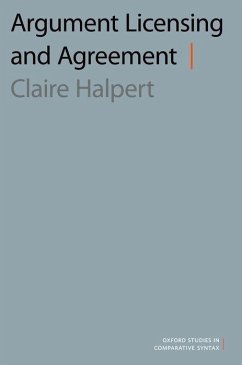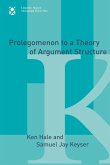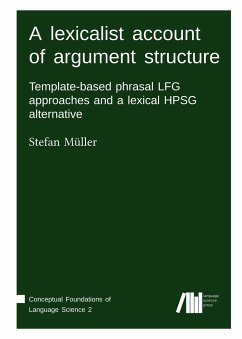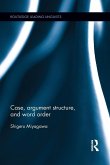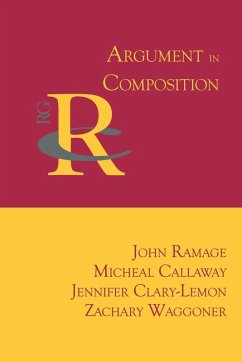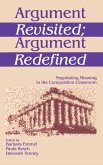Claire Halpert
Argument Licensing and Agreement
Claire Halpert
Argument Licensing and Agreement
- Broschiertes Buch
- Merkliste
- Auf die Merkliste
- Bewerten Bewerten
- Teilen
- Produkt teilen
- Produkterinnerung
- Produkterinnerung
This book presents a novel account for some unusual properties of Bantu grammar, arguing that Zulu has a robust system of syntactic and morphological case. This analysis illuminates a number of other properties in Zulu grammar, showing that despite surface unfamiliarity, its syntax is deeply similar to more familiar languages.
Andere Kunden interessierten sich auch für
![Cross-Linguistic Studies of Imposters and Pronominal Agreement Cross-Linguistic Studies of Imposters and Pronominal Agreement]() Chris CollinsCross-Linguistic Studies of Imposters and Pronominal Agreement56,99 €
Chris CollinsCross-Linguistic Studies of Imposters and Pronominal Agreement56,99 €![Prolegomenon to a Theory of Argument Structure Prolegomenon to a Theory of Argument Structure]() Ken HaleProlegomenon to a Theory of Argument Structure38,99 €
Ken HaleProlegomenon to a Theory of Argument Structure38,99 €![A lexicalist account of argument structure A lexicalist account of argument structure]() Stefan MüllerA lexicalist account of argument structure25,00 €
Stefan MüllerA lexicalist account of argument structure25,00 €![Case, Argument Structure, and Word Order Case, Argument Structure, and Word Order]() Shigeru MiyagawaCase, Argument Structure, and Word Order83,99 €
Shigeru MiyagawaCase, Argument Structure, and Word Order83,99 €![Argument in Composition Argument in Composition]() John RamageArgument in Composition36,99 €
John RamageArgument in Composition36,99 €![Case, Argument Structure, and Word Order Case, Argument Structure, and Word Order]() Shigeru MiyagawaCase, Argument Structure, and Word Order239,99 €
Shigeru MiyagawaCase, Argument Structure, and Word Order239,99 €![Argument Revisited; Argument Redefined Argument Revisited; Argument Redefined]() Barbara EmmelArgument Revisited; Argument Redefined165,99 €
Barbara EmmelArgument Revisited; Argument Redefined165,99 €-
-
-
This book presents a novel account for some unusual properties of Bantu grammar, arguing that Zulu has a robust system of syntactic and morphological case. This analysis illuminates a number of other properties in Zulu grammar, showing that despite surface unfamiliarity, its syntax is deeply similar to more familiar languages.
Hinweis: Dieser Artikel kann nur an eine deutsche Lieferadresse ausgeliefert werden.
Hinweis: Dieser Artikel kann nur an eine deutsche Lieferadresse ausgeliefert werden.
Produktdetails
- Produktdetails
- Verlag: OUP US
- Seitenzahl: 316
- Erscheinungstermin: 26. Oktober 2015
- Englisch
- Abmessung: 234mm x 156mm x 19mm
- Gewicht: 540g
- ISBN-13: 9780190256487
- ISBN-10: 0190256486
- Artikelnr.: 47863641
- Herstellerkennzeichnung
- Libri GmbH
- Europaallee 1
- 36244 Bad Hersfeld
- gpsr@libri.de
- Verlag: OUP US
- Seitenzahl: 316
- Erscheinungstermin: 26. Oktober 2015
- Englisch
- Abmessung: 234mm x 156mm x 19mm
- Gewicht: 540g
- ISBN-13: 9780190256487
- ISBN-10: 0190256486
- Artikelnr.: 47863641
- Herstellerkennzeichnung
- Libri GmbH
- Europaallee 1
- 36244 Bad Hersfeld
- gpsr@libri.de
Claire Halpert is Assistant Professor of Linguistics at the University of Minnesota, Twin Cities, where she joined the faculty after receiving her PhD from MIT in 2012. Her work focuses on the syntax and morphology of case and agreement, pursued from the perspective of the Bantu language family.
* Acknowledgments
* 1 Introduction
* 1.1 Bantu exceptionalism: what varies, and why?
* 1.2 Familiarity in the unfamiliar: insights on syntax and variation
* 1.3 A note on Zulu
* 2 A-movement and phi: building blocks of Zulu syntax
* 2.1 Anatomy of a nominal
* 2.2 Flexible word order
* 2.3 Subjects and agreement
* 2.3.1 Properties of vP-external subjects
* 2.3.2 Properties of vP-internal subjects
* 2.3.3 Optionality for subjects
* 2.4 Raising constructions in Zulu
* 2.4.1 Raising-to-subject
* 2.4.2 Raising-to-object
* 2.5 Beyond subject distribution: adding arguments
* 2.6 Summary
* 3 Uncovering argument licensing
* 3.1 Nominal distribution and case theory in Bantu
* 3.1.1 The profile of abstract case
* 3.1.2 Against standard case theory in Bantu
* 3.2 Augmentless Nominals
* 3.2.1 The distribution of augmentless nominals
* 3.3 Augmentless nominal licensing
* 3.3.1 The vP-internal restriction on augmentless nominals
* 3.3.2 Augmentless nominals within vP
* 3.3.3 Summary
* 3.4 Augmentless nominals and the case for case: a cross-linguistic
comparison
* 3.4.1 Revisiting the question of case in Bantu
* 3.4.2 Restricting augmentless nominals without case?
* 3.4.3 Clues from the broader Bantu landscape
* 3.5 Augmentless nominals as bare negative NPs?
* 3.5.1 Syntactic licensing of negative indefinites
* 3.6 Summarizing the case for case
* 3.A APPENDIX: Augmentless nominal overview
* 3.A.1 Augmentless nominals at the NP level
* 3.A.2 DP-level processes
* 3.A.3 Vocatives
* 3.A.4 Summary
* 4 Licensing and vP: evidence from the conjoint/disjoint alternation
* 4.1 Introduction
* 4.2 The conjoint/disjoint alternation: basic distribution
* 4.2.1 The conjoint/disjoint alternation and argument position
* 4.2.2 The conjoint/disjoint alternation with locatives and adverbs
* 4.2.3 Diagnostics for vP edge
* 4.2.4 Against a prosodic account of the conjoint/disjoint alternation
* 4.2.5 The conjoint/disjoint alternation as a marker of syntactic
constituency
* 4.3 A familiar signature
* 4.3.1 Asymmetric probe-goal relationships
* 4.3.2 Interim summary
* 4.4 The nature of L as a probe
* 4.4.1 The conjoint/disjoint alternation and clausal complements
* 4.4.2 The nature of locative and adverb categories
* 4.4.3 The selectiveness of L
* 4.4.4 Summary
* 4.5 Movement and the timing of the derivation
* 4.5.1 Activity and the lack of optionality
* 4.6 Investigating L and case: clues from Otjiherero
* 5 Case morphology in Zulu and beyond
* 5.1 Case classification
* 5.2 Structural licensing: recap
* 5.3 Zulu nominal prefixes and licensing
* 5.3.1 Classification of oblique prefixes
* 5.3.2 Structural restrictions on obliques
* 5.3.3 Case morphology in Zulu
* 5.3.4 Taking Stock
* 5.4 The augment and the role of case morphology in Zulu
* 5.5 Case and agreement interactions
* 5.5.1 On Agreeableness
* 5.5.2 Timing of agreement and case
* 5.5.3 The status of augment-permitting prefixes
* 5.5.4 Case concord?
* 5.6 Conclusion
* 6 Optional agreement and other consequences
* 6.1 Subject agreement: rule and exceptions
* 6.1.1 Complex NP subjects
* 6.1.2 Raised subjects
* 6.1.3 Tallying the score
* 6.2 Understanding optional agreement
* 6.2.1 Clausal agreement
* 6.2.2 Complex NP subjects
* 6.2.3 Raised subjects
* 6.3 EPP insights
* 6.3.1 Exotic cases of raising: English and Greek
* 6.4 Conclusion
* 7 Variation in the syntactic landscape
* 7.1 Accounting for Zulu
* 7.2 Morals for theory
* 7.2.1 Zulu and the organization of the grammar
* 7.2.2 Some final thoughts: Zulu and the nature of syntactic variation
* 1 Introduction
* 1.1 Bantu exceptionalism: what varies, and why?
* 1.2 Familiarity in the unfamiliar: insights on syntax and variation
* 1.3 A note on Zulu
* 2 A-movement and phi: building blocks of Zulu syntax
* 2.1 Anatomy of a nominal
* 2.2 Flexible word order
* 2.3 Subjects and agreement
* 2.3.1 Properties of vP-external subjects
* 2.3.2 Properties of vP-internal subjects
* 2.3.3 Optionality for subjects
* 2.4 Raising constructions in Zulu
* 2.4.1 Raising-to-subject
* 2.4.2 Raising-to-object
* 2.5 Beyond subject distribution: adding arguments
* 2.6 Summary
* 3 Uncovering argument licensing
* 3.1 Nominal distribution and case theory in Bantu
* 3.1.1 The profile of abstract case
* 3.1.2 Against standard case theory in Bantu
* 3.2 Augmentless Nominals
* 3.2.1 The distribution of augmentless nominals
* 3.3 Augmentless nominal licensing
* 3.3.1 The vP-internal restriction on augmentless nominals
* 3.3.2 Augmentless nominals within vP
* 3.3.3 Summary
* 3.4 Augmentless nominals and the case for case: a cross-linguistic
comparison
* 3.4.1 Revisiting the question of case in Bantu
* 3.4.2 Restricting augmentless nominals without case?
* 3.4.3 Clues from the broader Bantu landscape
* 3.5 Augmentless nominals as bare negative NPs?
* 3.5.1 Syntactic licensing of negative indefinites
* 3.6 Summarizing the case for case
* 3.A APPENDIX: Augmentless nominal overview
* 3.A.1 Augmentless nominals at the NP level
* 3.A.2 DP-level processes
* 3.A.3 Vocatives
* 3.A.4 Summary
* 4 Licensing and vP: evidence from the conjoint/disjoint alternation
* 4.1 Introduction
* 4.2 The conjoint/disjoint alternation: basic distribution
* 4.2.1 The conjoint/disjoint alternation and argument position
* 4.2.2 The conjoint/disjoint alternation with locatives and adverbs
* 4.2.3 Diagnostics for vP edge
* 4.2.4 Against a prosodic account of the conjoint/disjoint alternation
* 4.2.5 The conjoint/disjoint alternation as a marker of syntactic
constituency
* 4.3 A familiar signature
* 4.3.1 Asymmetric probe-goal relationships
* 4.3.2 Interim summary
* 4.4 The nature of L as a probe
* 4.4.1 The conjoint/disjoint alternation and clausal complements
* 4.4.2 The nature of locative and adverb categories
* 4.4.3 The selectiveness of L
* 4.4.4 Summary
* 4.5 Movement and the timing of the derivation
* 4.5.1 Activity and the lack of optionality
* 4.6 Investigating L and case: clues from Otjiherero
* 5 Case morphology in Zulu and beyond
* 5.1 Case classification
* 5.2 Structural licensing: recap
* 5.3 Zulu nominal prefixes and licensing
* 5.3.1 Classification of oblique prefixes
* 5.3.2 Structural restrictions on obliques
* 5.3.3 Case morphology in Zulu
* 5.3.4 Taking Stock
* 5.4 The augment and the role of case morphology in Zulu
* 5.5 Case and agreement interactions
* 5.5.1 On Agreeableness
* 5.5.2 Timing of agreement and case
* 5.5.3 The status of augment-permitting prefixes
* 5.5.4 Case concord?
* 5.6 Conclusion
* 6 Optional agreement and other consequences
* 6.1 Subject agreement: rule and exceptions
* 6.1.1 Complex NP subjects
* 6.1.2 Raised subjects
* 6.1.3 Tallying the score
* 6.2 Understanding optional agreement
* 6.2.1 Clausal agreement
* 6.2.2 Complex NP subjects
* 6.2.3 Raised subjects
* 6.3 EPP insights
* 6.3.1 Exotic cases of raising: English and Greek
* 6.4 Conclusion
* 7 Variation in the syntactic landscape
* 7.1 Accounting for Zulu
* 7.2 Morals for theory
* 7.2.1 Zulu and the organization of the grammar
* 7.2.2 Some final thoughts: Zulu and the nature of syntactic variation
* Acknowledgments
* 1 Introduction
* 1.1 Bantu exceptionalism: what varies, and why?
* 1.2 Familiarity in the unfamiliar: insights on syntax and variation
* 1.3 A note on Zulu
* 2 A-movement and phi: building blocks of Zulu syntax
* 2.1 Anatomy of a nominal
* 2.2 Flexible word order
* 2.3 Subjects and agreement
* 2.3.1 Properties of vP-external subjects
* 2.3.2 Properties of vP-internal subjects
* 2.3.3 Optionality for subjects
* 2.4 Raising constructions in Zulu
* 2.4.1 Raising-to-subject
* 2.4.2 Raising-to-object
* 2.5 Beyond subject distribution: adding arguments
* 2.6 Summary
* 3 Uncovering argument licensing
* 3.1 Nominal distribution and case theory in Bantu
* 3.1.1 The profile of abstract case
* 3.1.2 Against standard case theory in Bantu
* 3.2 Augmentless Nominals
* 3.2.1 The distribution of augmentless nominals
* 3.3 Augmentless nominal licensing
* 3.3.1 The vP-internal restriction on augmentless nominals
* 3.3.2 Augmentless nominals within vP
* 3.3.3 Summary
* 3.4 Augmentless nominals and the case for case: a cross-linguistic
comparison
* 3.4.1 Revisiting the question of case in Bantu
* 3.4.2 Restricting augmentless nominals without case?
* 3.4.3 Clues from the broader Bantu landscape
* 3.5 Augmentless nominals as bare negative NPs?
* 3.5.1 Syntactic licensing of negative indefinites
* 3.6 Summarizing the case for case
* 3.A APPENDIX: Augmentless nominal overview
* 3.A.1 Augmentless nominals at the NP level
* 3.A.2 DP-level processes
* 3.A.3 Vocatives
* 3.A.4 Summary
* 4 Licensing and vP: evidence from the conjoint/disjoint alternation
* 4.1 Introduction
* 4.2 The conjoint/disjoint alternation: basic distribution
* 4.2.1 The conjoint/disjoint alternation and argument position
* 4.2.2 The conjoint/disjoint alternation with locatives and adverbs
* 4.2.3 Diagnostics for vP edge
* 4.2.4 Against a prosodic account of the conjoint/disjoint alternation
* 4.2.5 The conjoint/disjoint alternation as a marker of syntactic
constituency
* 4.3 A familiar signature
* 4.3.1 Asymmetric probe-goal relationships
* 4.3.2 Interim summary
* 4.4 The nature of L as a probe
* 4.4.1 The conjoint/disjoint alternation and clausal complements
* 4.4.2 The nature of locative and adverb categories
* 4.4.3 The selectiveness of L
* 4.4.4 Summary
* 4.5 Movement and the timing of the derivation
* 4.5.1 Activity and the lack of optionality
* 4.6 Investigating L and case: clues from Otjiherero
* 5 Case morphology in Zulu and beyond
* 5.1 Case classification
* 5.2 Structural licensing: recap
* 5.3 Zulu nominal prefixes and licensing
* 5.3.1 Classification of oblique prefixes
* 5.3.2 Structural restrictions on obliques
* 5.3.3 Case morphology in Zulu
* 5.3.4 Taking Stock
* 5.4 The augment and the role of case morphology in Zulu
* 5.5 Case and agreement interactions
* 5.5.1 On Agreeableness
* 5.5.2 Timing of agreement and case
* 5.5.3 The status of augment-permitting prefixes
* 5.5.4 Case concord?
* 5.6 Conclusion
* 6 Optional agreement and other consequences
* 6.1 Subject agreement: rule and exceptions
* 6.1.1 Complex NP subjects
* 6.1.2 Raised subjects
* 6.1.3 Tallying the score
* 6.2 Understanding optional agreement
* 6.2.1 Clausal agreement
* 6.2.2 Complex NP subjects
* 6.2.3 Raised subjects
* 6.3 EPP insights
* 6.3.1 Exotic cases of raising: English and Greek
* 6.4 Conclusion
* 7 Variation in the syntactic landscape
* 7.1 Accounting for Zulu
* 7.2 Morals for theory
* 7.2.1 Zulu and the organization of the grammar
* 7.2.2 Some final thoughts: Zulu and the nature of syntactic variation
* 1 Introduction
* 1.1 Bantu exceptionalism: what varies, and why?
* 1.2 Familiarity in the unfamiliar: insights on syntax and variation
* 1.3 A note on Zulu
* 2 A-movement and phi: building blocks of Zulu syntax
* 2.1 Anatomy of a nominal
* 2.2 Flexible word order
* 2.3 Subjects and agreement
* 2.3.1 Properties of vP-external subjects
* 2.3.2 Properties of vP-internal subjects
* 2.3.3 Optionality for subjects
* 2.4 Raising constructions in Zulu
* 2.4.1 Raising-to-subject
* 2.4.2 Raising-to-object
* 2.5 Beyond subject distribution: adding arguments
* 2.6 Summary
* 3 Uncovering argument licensing
* 3.1 Nominal distribution and case theory in Bantu
* 3.1.1 The profile of abstract case
* 3.1.2 Against standard case theory in Bantu
* 3.2 Augmentless Nominals
* 3.2.1 The distribution of augmentless nominals
* 3.3 Augmentless nominal licensing
* 3.3.1 The vP-internal restriction on augmentless nominals
* 3.3.2 Augmentless nominals within vP
* 3.3.3 Summary
* 3.4 Augmentless nominals and the case for case: a cross-linguistic
comparison
* 3.4.1 Revisiting the question of case in Bantu
* 3.4.2 Restricting augmentless nominals without case?
* 3.4.3 Clues from the broader Bantu landscape
* 3.5 Augmentless nominals as bare negative NPs?
* 3.5.1 Syntactic licensing of negative indefinites
* 3.6 Summarizing the case for case
* 3.A APPENDIX: Augmentless nominal overview
* 3.A.1 Augmentless nominals at the NP level
* 3.A.2 DP-level processes
* 3.A.3 Vocatives
* 3.A.4 Summary
* 4 Licensing and vP: evidence from the conjoint/disjoint alternation
* 4.1 Introduction
* 4.2 The conjoint/disjoint alternation: basic distribution
* 4.2.1 The conjoint/disjoint alternation and argument position
* 4.2.2 The conjoint/disjoint alternation with locatives and adverbs
* 4.2.3 Diagnostics for vP edge
* 4.2.4 Against a prosodic account of the conjoint/disjoint alternation
* 4.2.5 The conjoint/disjoint alternation as a marker of syntactic
constituency
* 4.3 A familiar signature
* 4.3.1 Asymmetric probe-goal relationships
* 4.3.2 Interim summary
* 4.4 The nature of L as a probe
* 4.4.1 The conjoint/disjoint alternation and clausal complements
* 4.4.2 The nature of locative and adverb categories
* 4.4.3 The selectiveness of L
* 4.4.4 Summary
* 4.5 Movement and the timing of the derivation
* 4.5.1 Activity and the lack of optionality
* 4.6 Investigating L and case: clues from Otjiherero
* 5 Case morphology in Zulu and beyond
* 5.1 Case classification
* 5.2 Structural licensing: recap
* 5.3 Zulu nominal prefixes and licensing
* 5.3.1 Classification of oblique prefixes
* 5.3.2 Structural restrictions on obliques
* 5.3.3 Case morphology in Zulu
* 5.3.4 Taking Stock
* 5.4 The augment and the role of case morphology in Zulu
* 5.5 Case and agreement interactions
* 5.5.1 On Agreeableness
* 5.5.2 Timing of agreement and case
* 5.5.3 The status of augment-permitting prefixes
* 5.5.4 Case concord?
* 5.6 Conclusion
* 6 Optional agreement and other consequences
* 6.1 Subject agreement: rule and exceptions
* 6.1.1 Complex NP subjects
* 6.1.2 Raised subjects
* 6.1.3 Tallying the score
* 6.2 Understanding optional agreement
* 6.2.1 Clausal agreement
* 6.2.2 Complex NP subjects
* 6.2.3 Raised subjects
* 6.3 EPP insights
* 6.3.1 Exotic cases of raising: English and Greek
* 6.4 Conclusion
* 7 Variation in the syntactic landscape
* 7.1 Accounting for Zulu
* 7.2 Morals for theory
* 7.2.1 Zulu and the organization of the grammar
* 7.2.2 Some final thoughts: Zulu and the nature of syntactic variation

